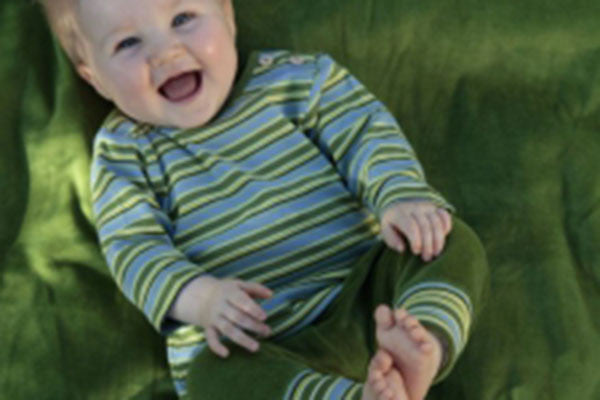Dressing your little one can be one of the most fun jobs as a new parent. There are few things more exciting than picking baby outfits.
Those tiny jumpsuits, jackets, and tiny socks are irresistible.
I know when I found out I was having a son, one of the very first things I did was looking for some great baby outfits.
In the midst of all of the excitement of a new baby, you may not consider what's in the clothing you are purchasing for your baby outfits or how fabric choices may contribute to living a more natural lifestyle.
In many ways, I was always more drawn to the organic side of life without giving it to much thought or reason. I just love it!
Therefore our trip back home to Germany in 2009 included some serious shopping time in one of my favorite local Organic Baby and Children clothes stores and getting ready for our new family addition.
That's were I first came more in contact with Brands like LEELA COTTON & LOUD+PROUD, which make adorable baby outfits that cater so beautifully for baby's delicate & sensitive skin.

Cotton Baby Outfits
When shopping for children's clothing, you'll find that most children's clothing is made out of cotton. This is perfect for baby outfits.
So let's have a look at SOME BASICS ABOUT COTTON to help you picking the right clothes for these special first weeks of your newborn
For centuries cotton has been the raw material for all kinds of clothing. Due to its body-friendly qualities it used to be called white gold in ancient times. Cotton is very absorbent, that is why it is perfect for clothes that are in direct contact with our skin such as underwear, nightwear, bathrobes, casual wear and baby overalls. Cotton balances our body temperature, does not cause skin-irritations or allergies, thus it is a perfect fit for people with sensitive skin, especially babies and children.
ECOLOGICAL AND SOCIAL ASPECTS
Cotton is the most important natural resource for textiles in the world. Cotton cultivated in a conventional way (not organic cotton) is one of the plants that are treated most with pesticides. Artificial irrigation, the use of pesticides, defoliants, insecticides, and other chemical breeding techniques result in environmental damage, pollution and the destruction of natural resources. In addition, the steady use of chemicals has a huge impact on the health of the workers in the fields.
But it is not only their health that is damaged
Chemical additives and so-called refinement help produce a fabric that wont wrinkle or shrink, one that will absorb less dirt and moisture, and one that is moth proof, antibacterial and easy to iron. The downside of this is a danger to our skin and the loss of cottons original qualities that are listed above. Apart from that, cotton is treated with chlorine bleach to lighten up the natural color of cotton; this health damaging chemical turns it into a purely white colored fabric that does not really resemble much the original color. During the process of dyeing lots of products that damage health and the environment are used - they can cause allergies and eczema. Hence what used to be a body-friendly material becomes, with the use of chemicals, a fabric that is rather health-damaging.
That is why organic cotton came into play!
To ameliorate the environmental and working conditions and of course to produce clothes that are a joy to our skin,
LEELA COTTON only uses organic cotton - since 1994.
LEELA COTTON
Leela Cotton's organic cotton is grown in Turkey, free of pesticides, insecticides and fertilizers. Every two to three years a crop rotation is taken. Only natural products are used for fertilizing. Only biological methods are employed to combat weed and pest. Defoliants are not part of the process; instead cotton is culled by hand. That way the ecological balance in the growing area is kept; the ground, the air and the water are not polluted and the workers health is not endangered. Chemical additives do not play a role in the processing of organic cotton - formaldehyde, flame resistant, moth resistant and static inhibitors are not applied. The clothes are printed and dyed in an ecological way. The dye does not consist of toxins; it is eco-friendly and synthetic.Unfortunately plant colors are not an alternative because they do not last on cotton.
Besides, environmentalists doubt that the mass use of plant colors would be an ecological improvement,as an example of this the color indigo caused problems with the effluents.
During the process of dyeing no optical brighteners, heavy metals and no chlorine bleach are used.
The prints are water-based. White garments are bleached with oxygen. Some garments are not dyed at all.
Accessories such as buttons or zippers are made from natural products ?the buttons are made of wood, shell or coco, the zippers of nickel-free metal.
For sewing only cotton yarns are used; unfortunately, due to their breaking strength they have to be mercerized, though.
CONTROL UNION CERTIFICATION B.V. is an independent and internationally approved organisation verifying every step from the cultivation and processing of cotton up to the final product, according to "Global Organic Textile Standards" (GOTS).
The entire process of production takes place in Turkey, thus there are no unnecessary transport routes.
Another part of the inspection deals with the social conditions of the workers in the fields and in the places of production.
The factory in Izmir takes care of European social standards: no child labour (minimum age of the workers is sixteen years of age), minimum wages, maternity and sickness benefits, compliance with industrial safety regulations, no forced overtime.
I hope that you can see the advantages of baby outfits made from organic cotton, especially for your baby's delicate and sensitive skin and that you will feel the joy of dressing your baby!






